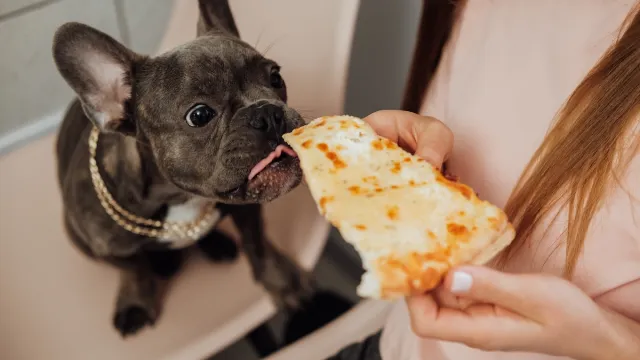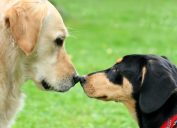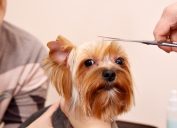New Study Identifies the Surprising Foods Making Your Dog Overweight
It may be smart to skip the pup cup the next time you stop at Starbucks.

Many of us firmly believe dogs deserve all the treats in the world—puppy eyes exist for a reason, right? Sometimes this means a spontaneous trip to Starbucks for a pup cup, or we may glance the other way while accidentally dropping a few deli meat scraps on the floor. But a new study from Pet Range is warning dog owners that some seemingly healthy human treats are actually contributing to serious weight gain in canines.
RELATED: 11 Surprising Foods That Are Toxic to Dogs, According to Pet Experts.
Nearly 60 percent of dogs in the U.S. are classified as overweight or obese, according to the 2022 Pet Obesity Prevalence Survey. Naturally, some dog breeds are more prone to obesity than others. These include Pugs, Beagles, Golden Retrievers, English Springer Spaniels, Border Terriers, Labrador Retrievers, Cavalier King Charles Spaniels, and Cocker Spaniels, per a study published in the Journal of Small Animal Practice.
"Most of us don't realize just how calorie-dense our food can be for our pets. This is especially the case for smaller dogs and breeds which are more obesity-prone, such as pugs. For small dogs like these, a single sausage can take up almost half of their daily recommended calorie intake," explained Lisa Melvin, a Pet Range spokesperson.
According to the Pet Range study, the recommended daily calorie intake for an extra small canine (weighing between 4.4 and 11 pounds) is between 165 and 328 calories. Meanwhile, small dogs (weighing between 11 and 22 pounds) like a Pug and medium-sized dogs (weighing between 22 and 44 pounds) like a Beagle are recommended to consume between 328 and 551 calories and 551 and 927 calories, respectively.
Larger dogs like Dalmatians and Australian Shepherds typically weigh between 44 and 66 pounds and are recommended to consume between 927 and 1,256 calories per day. Extra large canines weighing between 66 and 88 pounds should consume 1,256 to 1,559 calories. If you own an extra-extra large dog such as a Rottweiler (weighs between 88 and 110 pounds), you should feed them about 1,559 to 1,843 calories per day, says Pet Range.
Knowing your pup's size, recommended weight, and suggested daily calorie intake can help owners make informed decisions about their pet's eating habits and where human treats fall into the mix. A celebratory slice of cheese or strip of bacon for a job well done may seem harmless, but when coupled with other human snacks and dog food, it can be seriously detrimental.
"While not all human food is necessarily bad or unsafe for our pets, we often don't provide them in moderation. This can lead to our pets getting a lot of excess calories without us even realizing," says Pet Range.
Of those foods that should be provided in moderation, you may be surprised to hear that the top five fall in the meat and seafood category. Bacon, sausage, roasted chicken, grilled salmon, and roasted turkey can all contribute to weight gain in dogs. For instance, one chicken drumstick is 10 percent of a large dog's daily calorie intake.
Also interesting, scrambled eggs, white rice, and peanut butter aren't exactly great for dogs either. One scrambled egg accounts for 17.5 percent of a small dog's daily calorie consumption. Pet Range warns that cheddar cheese and pup cups (mini cups of whipped cream) can also lead to weight gain in dogs.
"It's not surprising that obesity can have such a big impact on a dog's health, but many of us don't realize just how many conditions can be linked to having excess weight," said Melvin.
RELATED: Fact Check: Can a New Supplement Add Years to Your Dog's Life?
In some cases, obesity can lead to problems with bone health, heart health, and a dog's overall well-being.
"Fortunately, there are a number of ways to help your pooch stay a healthy weight, even if they're on the obesity-prone list," Melvin assured. Owners can reduce their dog's calorie intake and get their health back on track by offering nutrient-filled meals and rewards that aren't food, making exercise fun, and providing human treats in moderation.
That said, "It's always a good idea to see a vet if you have concerns about your pet's weight," Melvin noted.
"Every dog is different, and just like humans, they all have different nutritional needs. Whether your furry friend is a puppy or fully grown, consult with the vet before making major dietary changes," she concluded.





















